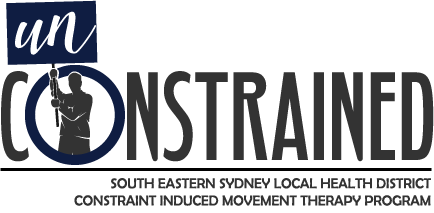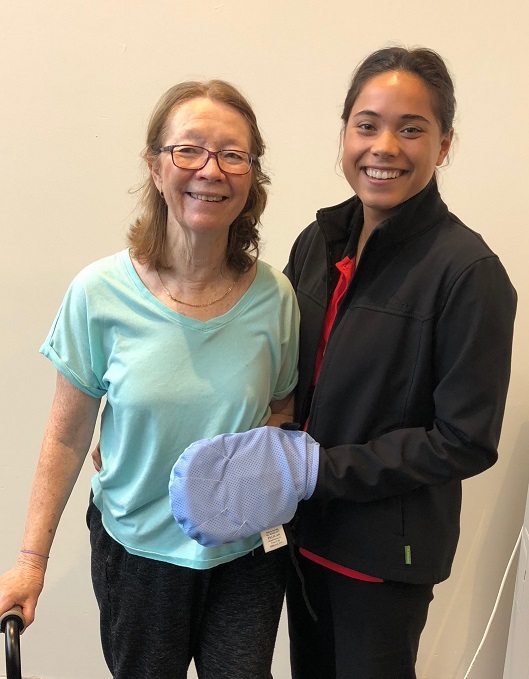This is for SSEH
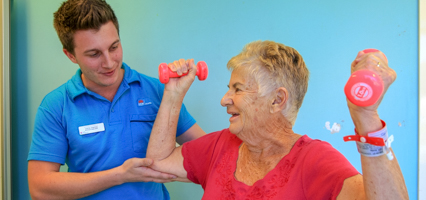
Physiotherapy - Royal Hospital for Women
How we can help you
Our Physiotherapy department can help you improve your bladder, bowel and sexual health. We work with you to assess your needs, set goals and provide treatments and exercise programs to help you reach your goals. Our services are accessible to women, men and gender diverse people living with:
- Breast and gynaecology cancer treatment and common symptoms/side effects
- Prostate cancer treatment and common symptoms/side effects
- Bladder, bowel and sexual disorders
- Conditions specific to pregnancy & childbirth
- Symptoms of menopause
- Lymphoedema of the arms and legs
We do this by:
- Finding out what the problem is when you come to your first appointment
- Understanding your needs and concerns
- Working with you to come up with a plan of how exercise can help you both in the short and long term
- Providing support for self-management
We offer both individual services as well as group based programs.
Randwick, NSW 2031
Manager
Hannah Graetz, Head of Department
Opening times
8:00am - 4:30pm Monday - Friday
Referrals
Send your referral to us e:SESLHD-PhysioRHW-Refer@health.nsw.gov.au or self-refer here
How to find us
Physiotherapy Department, Level 0, Royal Hospital for Women (Building 17 on our campus map)
-33.918985810091, 151.23821843381
We can help you if you have problems with bladder or bowel function, sexual health, pain or movement caused by injury or disease. We look after patients staying at The Royal Hospital for Women and those in the community who have been referred to one of our outpatient clinics. We also see patients referred from outpatient clinics on campus, for example:
- RHW gynaecology oncology outpatients
- POWH/RHW Breast Service
- POWH Urology department
- RHW gynaecology outpatients
- UNSW Lifestyle Clinic
- RHW/POWH pain clinics
Our outpatient clinics are for those living in the community. Our clinics include:
- Physiotherapy outpatient service: We care for people living in the community with problems with their bladder, bowel and sexual health. We also support people as they recover from or plan to have surgery for example, breast, prostate and gynaecological surgery.
- Cancer Prehab and Rehab: We help people having cancer treatment (chemotherapy, radiation, surgery) by providing exercise plans, education, social support and self-management advice to improve response to cancer treatment, reduce cancer-related fatigue and manage side effects.
- Gestational diabetes GYM: We run exercise programs in the physiotherapy gymnasium to support people with diabetes in pregnancy improve their glucose control; provide follow-up after birth via our postnatal lifestyle session and prevent a diagnosis of diabetes for pregnant people who might be at risk.
- EMBODY: We provide virtual weekly group physiotherapy during pregnancy and after birth. The EMBODY program has been designed to be completed weekly during pregnancy and for up to 3-6 months after having a baby. The program combines movement with education to prevent common pelvic floor problems and improve the health of childbearing people. It’s a great way to get your pelvic floor exercises done!
Our team includes trained pelvic floor physiotherapists, student physiotherapists and visiting physiotherapists completing training in pelvic health who will be responsible for your assessment and physiotherapy treatment plan.
We work in partnership with specialist nurses, midwives, medical and surgical specialists and your local doctor (GP).
Our administration officers can help you with bookings, referral management and telephone enquires.
We provide options to attend physiotherapy appointments and exercise programs via telehealth. This means that we communicate with you through a video link on your computer screen. We recommend attending your first appointment in person. If you would like to attend subsequent appointments via telehealth, you can discuss whether this option is suitable for you with your physiotherapist.
Health professional referral:
To come to the Physiotherapy Outpatient Department you will need to have your local doctor (GP) or treating specialist write you a referral letter explaining your relevant surgical and medical history. The referral may then be mailed, emailed or faxed to us or you can bring it into our department in person.
To make or cancel an appointment please telephone 9382 6540.
We try to see all of our patients as quickly as possible. However, we have a large number of patients seeking treatment. Appointments are offered based on urgency. Urgent conditions are generally given an appointment within a few days of receiving the referral. Non-urgent conditions may need to go on a waiting list. It can take up to 2 months for non-urgent conditions to receive an appointment.
Can I chose the day and time I attend appointments?
We will try to find appointment times that suit your availability. Our hours of operation however are 8:30am - 4:00pm Monday to Friday. We do not offer weekend treatments.
Self-referral for Physiotherapy services:
We are a teaching hospital and you may be asked to be involved in research or for a student to be present at your appointment. You have a right to say no. If you do so, this will not impact in any way on the services we will provide. All physiotherapists in our team are committed to achieving the best possible health outcome for you and complete regular supervision with a senior or specialist physiotherapist. You can ask your physiotherapist if your care can be reviewed with a senior or specialist physiotherapist and your physiotherapist might suggest this from time to time.
Please let us know if you need an interpreter. You can contact us telephoning the Translating and Interpreting Service (TIS) on 131 450. Tell the operator what language you speak and then ask the interpreter to set up a telephone conversation between you, an interpreter, and the healthcare professional you want to speak with.
Read about other women's experiences of Physiotherapy by following the link below.
Care Opinion
Share your experiences of Australian health and care services by following the link below. We pass your stories to the right people to make a difference.
Care Opinion
Allied Health
In addition to the expert medical care and support provided by our nurses, doctors and midwives at the Royal Hospital for Women, we have an expert team of Allied Health Staff. Allied Health Professionals are highly qualified and skilled professionals who work with you to prevent, diagnose and treat a wide range of illnesses and conditions. We provide high quality evidence based care with a multidisciplinary focus to ensure that your physical, psychological and social needs are addressed. We provide care across the lifespan from newborn to aged care and in hospital, community, home and outpatient settings.
Allied Health play an important role in supporting you to return to your best level of function, and to stay well and out of hospital.
Find information about Allied Health services at the Royal Hospital for Women from the following pages:
How to find us
Royal Hospital for Women (Building 17 on our campus map)
-33.91894269299, 151.23823785512
Physiotherapy- Prince of Wales Hospital
How we can help you
Our Physiotherapy department can help you improve your movement and function. We work with you to assess your needs, set goals and provide treatments and exercise programs to help you reach your goals.
Our Physiotherapists are highly trained and can provide the following treatments:
- exercise programs to improve mobility and strengthen muscles
- joint mobilisation to reduce pain and stiffness
- muscle re-education to help you control your movements
- breathing exercises and techniques to help you clear your airways
- assistance with use of aids, splints, crutches, walking sticks and wheelchairs
- education regarding your condition and how you can help manage it yourself.
Manager
Daniel Treacy, Head of Department
Tim Morocombe, Deputy Head of Department
Opening times
8.00am - 4.30pm Monday - Friday
How to find us
Physiotherapy Department, Level 1, High Street Building, Prince of Wales Hospital (Building 2 on our campus map)
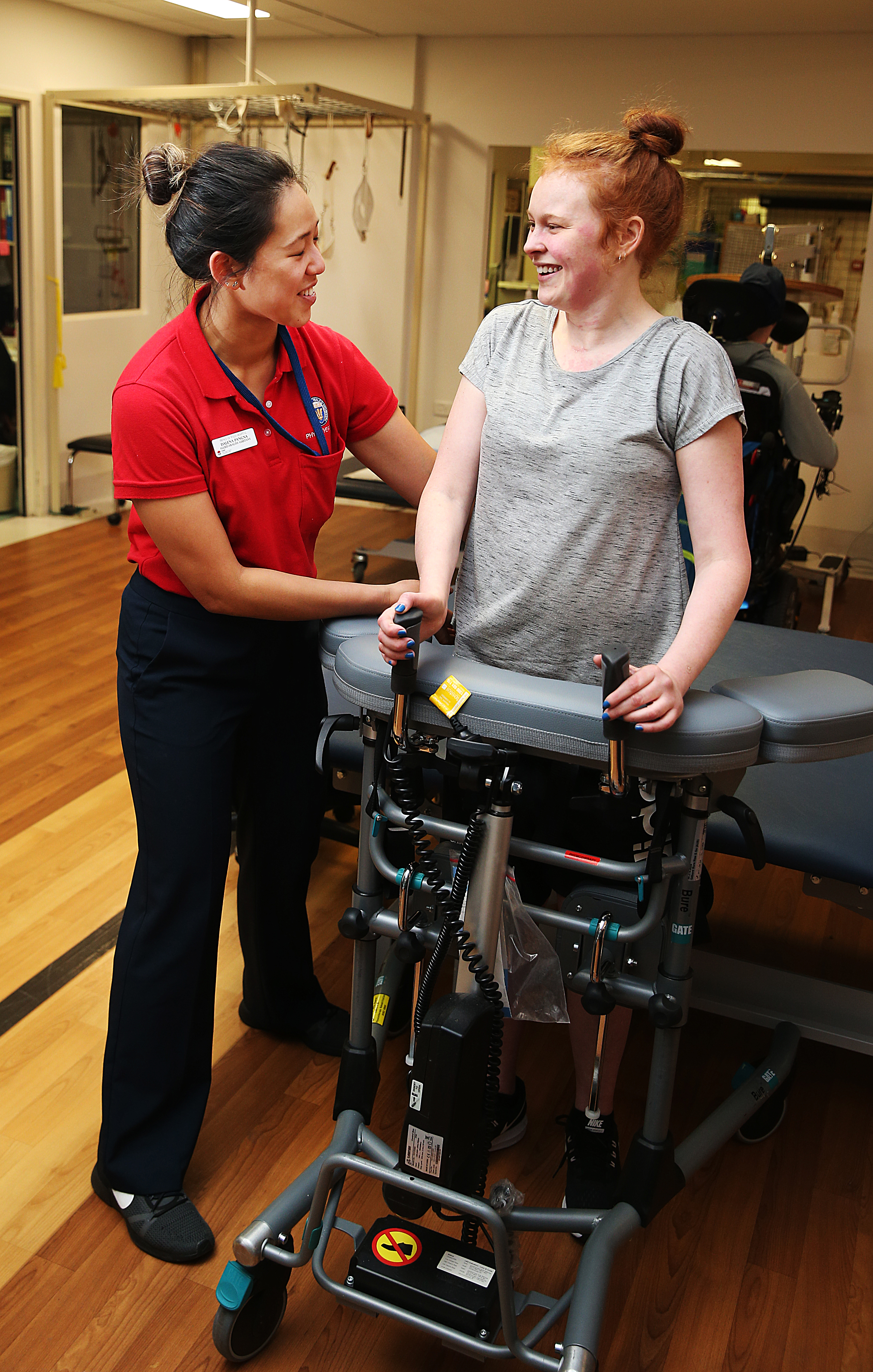
We can help you if you have problems with pain or movement caused by injury or disease. We look after patients staying at Prince of Wales Hospital and those in the community who have been referred to one of our outpatient clinics.
Our outpatient clinics are for those living in the community. Our clinics include:
- Physiotherapy outpatient service - we care for people living in the community with problems with their bones and muscles caused by disease, trauma or overuse. We also support people as they recover from surgery.
- Hydrotherapy outpatient service - we use pool exercises to help people reduce any pain or problems you may have with your bones and muscles
- Pulmonary and Heart Failure Rehabilitation Program - we help people with long-term lung and heart problems by providing exercise plans, education, training on how to self-manage your health and social support.
We are teaching hospital and you may be asked to be involved in research or for a student to be present at your appointment. You have a right to say no. If you do so, this will not impact in any way on the services we will provide.
Please let us know if you need an interpreter. You can contact us telephoning the Translating and Interpreting Service (TIS) on 131 450. Tell the operator what language you speak and then ask the interpreter to set up a telephone conversation between you, an interpreter, and the healthcare professional you want to speak with.
Constraint Induced Movement Therapy (CIMT)
|
Constraint Induced Movement Therapy (CIMT) is a therapy program that can be used to improve the strength, use and function of a weak arm and hand following a stroke or acquired brain injury. It is an intensive program that will be run over a 2 week clinic at Prince of Wales Hospital, St George Hospital and Sutherland Hospital each year. It involves the encouragement of use of the weak (or affected arm) and restraint of the strong (or unaffected arm). Participants will be required to participate in 4 hours of therapy per day, with an additional 1 hour of homework and commit to wearing the restraint (in the form of a soft mitt) for most of the day. Though intensive, the results for the right people are better than usual therapy, and have strong supporting evidence from the 2017 Clinical Guidelines for Stroke Management (National Stroke Foundation Australia). Participants must have some movement in their wrist and fingers and be able to consent to the program. |
|
Please click on the box which best describes you:
I am a stroke survivor or carer |
I am a health professional |
I want to make a referral |
I want to contact you |

St George Hospital, Gray Street, Kogarah, 2217
Sutherland Hospital, The Kingsway, Caringbah, 2229
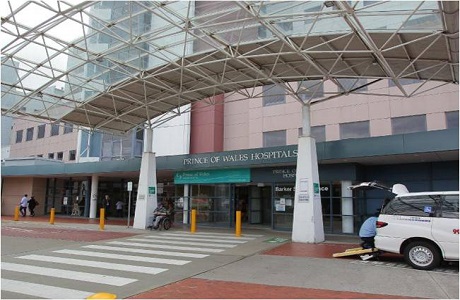
Physiotherapy - Sydney and Sydney Eye Hospital
Physiotherapists work with people who need help to recover from an injury or illness. We make sure that each patient is treated individually.
If you are an inpatient at Sydney and Sydney Eye Hospital you may be seen by a physiotherapist.
The physiotherapist will:
- see if a person can walk safely
- give advice on how to walk safely
- help patients manage falling
- help patients learn how to walk
- recommend walking aids
- make sure a patient can carry out their daily tasks
- assess and treat any breathing problems that was caused by an infection
- give advice on how to care for yourself after an operation.
- fit orthopaedic braces and casts
You can contact the Physiotherapist through the Hospital Switchboard on (02) 9382 7111
Sydney, NSW, 2001
-33.8684884, 151.2124807
Physiotherapy - Sydney and Sydney Eye Hospital
Physiotherapists work with people who need help to recover from an injury or illness. We make sure that each patient is treated individually.
If you are an inpatient at Sydney and Sydney Eye Hospital you may be seen by a physiotherapist.
The physiotherapist will:
- see if a person can walk safely
- give advice on how to walk safely
- help patients manage falling
- help patients learn how to walk
- recommend walking aids
- make sure a patient can carry out their daily tasks
- assess and treat any breathing problems that was caused by an infection
- give advice on how to care for yourself after an operation.
- fit orthopaedic braces and casts
You can contact the Physiotherapist through the Hospital Switchboard on (02) 9382 7111
Sydney, NSW, 2001
-33.8684884, 151.2124807
Orthotics Department
How can we help you?
We specialise in the assessment, design, manufacture and fit of orthoses for adults and children with physical disability or impairment. We often help people who have a spinal cord injury, rheumatology, lymphoedema, cerebral palsy, brain injury, scoliosis, plagiocephaly, excessive pain, foot disorders, orthopaedic or neuromuscular related needs.
|
Orthoses are assistive devices that are applied externally to the body. Orthoses are commonly used to support, correct or protect parts of the body such as the head, neck, arms, legs and spine. Orthoses may help some people in performing activities of daily living. |
We mostly provide orthotic care and rehabilitation to children and adults who are inpatients and outpatients of the Sydney Children’s Hospital and Prince of Wales Hospital at the Randwick Campus.
We also provide services to people referred directly to us (private referrals) although you would likely be charged in this case.
Managers
Manager Ruth Baker,
Deputy Manager Peter Hawes
Clinic times
8:30am – 4:30pm Monday to Friday
Closed weekends.
How to find us
Level 1, Parkes Building, Prince of Wales Hospital (building 7 on our campus map)
The entrance is the sliding glass door between the lifts.
Our team includes:
Orthotists are allied health professionals who assess and treat the physical and functional limitations of people resulting from illnesses and disabilities. Orthotists are trained to prescribe, design, fit and monitor orthoses.
Technicians and Technical Assistants manufacture the orthoses from casts, measurements, materials and components at the orthotics service. They may also provide technical advice and assistance during your visit.
Administration staff will help you make appointments, inform you about what will happen at the Orthotics Department and answer any questions you may have.
We work in partnership with your medical specialist, physiotherapist and other medical professionals at the Sydney Children’s Hospital and Prince of Wales Hospital and Community Health Services.
If you are new to our service, you will need a referral to attend our Orthotics Department. A referral from a medical specialist is preferred. Your local general practitioner (GP) can refer you to a suitable specialist if you don’t have one already. Alternatively your local doctor may refer to us directly although there is likely to be a cost to you.
Please ask your Doctor to fax the referral to our department on 9382 8178. We will then contact you to make an appointment.
If you need an adjustment or replacement of a device we have already provided then you don’t need a new referral. If your medical condition has changed and you need a different device then a new referral is required.
Call the Orthotics Department on 9382 8184 to make, cancel or change an appointment.
How often do I need to attend the Orthotics Department?
You will need to attend for an initial assessment and any subsequent visits associated with the provision of the orthoses. This may include a cast, scan or measurement followed by fitting and adjustment. Your Orthotist may ask you to return for review, adjustment and maintenance of the orthoses. You should make an appointment if you are having any problems or concerns with your orthoses.
You will not be charged for your orthoses if you are eligible for Medicare and have a current referral (no older than 12 months) from one of the following:
- Prince of Wales Hospital Inpatient or Outpatient services.
- POWH Community Health Team.
- Sydney Children’s Hospital.
You may be charged for your orthoses if one of the following applies:
- You are Medicare ineligible (eg non-resident of Australia who is not covered by a Reciprocal Health Care Agreement).
- You are referred directly to Orthotics by a General Practitioner, a Medical Specialist from private rooms or from other hospitals.
- You are covered by Motor Vehicle Accident, Work Cover or other third party insurance. In this case you could claim the cost back from these organisations.
Some private health funds may offer a partial refund for orthoses.
If I am charged for my orthoses, how much would it cost?
It depends on the type and complexity of the orthoses. Also we have a fee structure depending on your circumstance. Speak with your orthotist or contact the Orthotics Department for more information.
People sometimes associate the word orthotics with feet. We make many kinds of orthoses to fit the head, neck, arms, legs and spine. It depends on your needs.
Waiting times to see an orthotist can vary from a few days to several weeks depending on the clinical urgency and availability of bookings.
Generally speaking simple adjustments and the provision of off the shelf orthoses can be done on the day of the appointment.
Complex adjustments or follow up fittings require a return visit.
Time associated with the manufacture of orthoses, the ordering in of prefabricated orthoses or parts can vary. Ask your orthotist for an estimated week of completion.
Please bring:
- Current Medicare card or Veteran Affairs card
- Any Health Care Card, Pensioner Concession Card or Commonwealth Seniors Health Care Card.
- Insurer details (eg workers compensation, public liability or third party).
- If you are not eligible for Medicare you may need to pay for the some of the services you use.
- Your Private Health Fund Membership card if you are currently insured with a private health fund.
- Recent x-rays or medical images and their reports, if applicable.
- Current orthoses or supports you may have.
- Suitable clothing as the orthotists may need to examine your body movement or measure part of your body. If you are being seen for:
- Foot/ankle: bring your everyday footwear, sports or walking shoes.
- Legs: bring shorts or clothing that can be brought above the knees.
- Back, spine or arms: singlet / under garments.
Call us if you have any questions or concerns about what to bring.
Please let us know if you need an interpreter. You can contact us by telephoning the Translating and Interpreting Service (TIS) on 131 450. Tell the operator what language you speak, and then ask the interpreter to set up a telephone conversation between you, an interpreter, and the Orthotics Department on (02) 9382 8184.
We are a teaching hospital and you may be asked to be involved in research or for a student to be present at your appointment. You have a right to say no. If you do so, this will not impact in any way on the services we will provide.
Orthotics Department
How can we help you?
We specialise in the assessment, design, manufacture and fit of orthoses for adults and children with physical disability or impairment. We often help people who have a spinal cord injury, rheumatology, lymphoedema, cerebral palsy, brain injury, scoliosis, plagiocephaly, excessive pain, foot disorders, orthopaedic or neuromuscular related needs.
|
Orthoses are assistive devices that are applied externally to the body. Orthoses are commonly used to support, correct or protect parts of the body such as the head, neck, arms, legs and spine. Orthoses may help some people in performing activities of daily living. |
We mostly provide orthotic care and rehabilitation to children and adults who are inpatients and outpatients of the Sydney Children’s Hospital and Prince of Wales Hospital at the Randwick Campus.
We also provide services to people referred directly to us (private referrals) although you would likely be charged in this case.
Managers
Manager Ruth Baker,
Deputy Manager Peter Hawes
Clinic times
8:30am – 4:30pm Monday to Friday
Closed weekends.
How to find us
Level 1, Parkes Building, Prince of Wales Hospital (building 7 on our campus map)
The entrance is the sliding glass door between the lifts.
Our team includes:
Orthotists are allied health professionals who assess and treat the physical and functional limitations of people resulting from illnesses and disabilities. Orthotists are trained to prescribe, design, fit and monitor orthoses.
Technicians and Technical Assistants manufacture the orthoses from casts, measurements, materials and components at the orthotics service. They may also provide technical advice and assistance during your visit.
Administration staff will help you make appointments, inform you about what will happen at the Orthotics Department and answer any questions you may have.
We work in partnership with your medical specialist, physiotherapist and other medical professionals at the Sydney Children’s Hospital and Prince of Wales Hospital and Community Health Services.
If you are new to our service, you will need a referral to attend our Orthotics Department. A referral from a medical specialist is preferred. Your local general practitioner (GP) can refer you to a suitable specialist if you don’t have one already. Alternatively your local doctor may refer to us directly although there is likely to be a cost to you.
Please ask your Doctor to fax the referral to our department on 9382 8178. We will then contact you to make an appointment.
If you need an adjustment or replacement of a device we have already provided then you don’t need a new referral. If your medical condition has changed and you need a different device then a new referral is required.
Call the Orthotics Department on 9382 8184 to make, cancel or change an appointment.
How often do I need to attend the Orthotics Department?
You will need to attend for an initial assessment and any subsequent visits associated with the provision of the orthoses. This may include a cast, scan or measurement followed by fitting and adjustment. Your Orthotist may ask you to return for review, adjustment and maintenance of the orthoses. You should make an appointment if you are having any problems or concerns with your orthoses.
You will not be charged for your orthoses if you are eligible for Medicare and have a current referral (no older than 12 months) from one of the following:
- Prince of Wales Hospital Inpatient or Outpatient services.
- POWH Community Health Team.
- Sydney Children’s Hospital.
You may be charged for your orthoses if one of the following applies:
- You are Medicare ineligible (eg non-resident of Australia who is not covered by a Reciprocal Health Care Agreement).
- You are referred directly to Orthotics by a General Practitioner, a Medical Specialist from private rooms or from other hospitals.
- You are covered by Motor Vehicle Accident, Work Cover or other third party insurance. In this case you could claim the cost back from these organisations.
Some private health funds may offer a partial refund for orthoses.
If I am charged for my orthoses, how much would it cost?
It depends on the type and complexity of the orthoses. Also we have a fee structure depending on your circumstance. Speak with your orthotist or contact the Orthotics Department for more information.
People sometimes associate the word orthotics with feet. We make many kinds of orthoses to fit the head, neck, arms, legs and spine. It depends on your needs.
Waiting times to see an orthotist can vary from a few days to several weeks depending on the clinical urgency and availability of bookings.
Generally speaking simple adjustments and the provision of off the shelf orthoses can be done on the day of the appointment.
Complex adjustments or follow up fittings require a return visit.
Time associated with the manufacture of orthoses, the ordering in of prefabricated orthoses or parts can vary. Ask your orthotist for an estimated week of completion.
Please bring:
- Current Medicare card or Veteran Affairs card
- Any Health Care Card, Pensioner Concession Card or Commonwealth Seniors Health Care Card.
- Insurer details (eg workers compensation, public liability or third party).
- If you are not eligible for Medicare you may need to pay for the some of the services you use.
- Your Private Health Fund Membership card if you are currently insured with a private health fund.
- Recent x-rays or medical images and their reports, if applicable.
- Current orthoses or supports you may have.
- Suitable clothing as the orthotists may need to examine your body movement or measure part of your body. If you are being seen for:
- Foot/ankle: bring your everyday footwear, sports or walking shoes.
- Legs: bring shorts or clothing that can be brought above the knees.
- Back, spine or arms: singlet / under garments.
Call us if you have any questions or concerns about what to bring.
Please let us know if you need an interpreter. You can contact us by telephoning the Translating and Interpreting Service (TIS) on 131 450. Tell the operator what language you speak, and then ask the interpreter to set up a telephone conversation between you, an interpreter, and the Orthotics Department on (02) 9382 8184.
We are a teaching hospital and you may be asked to be involved in research or for a student to be present at your appointment. You have a right to say no. If you do so, this will not impact in any way on the services we will provide.
